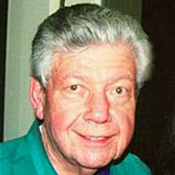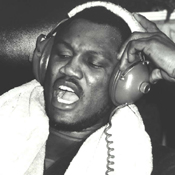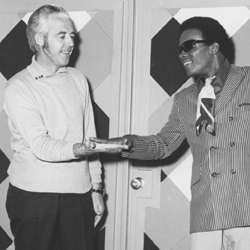
In April 1968, Mitch Corday and I started Soul Music Survey, a Rhythm and Blues Record report; Pop Music Survey, a Pop/Top 40 Music report; and Country Music Survey, a Country Music report. We hired my old friend
Harv Moore, a well respected local D.J. at WPGC, to be Editor of Pop Music Survey. We hired
Tom McEntee away from Cash Box Magazine to be Editor of Country Music Survey. We hired a young black woman, Dee Dee Dabney, away from a top R&B station in Philadelphia to be Editor of Soul Music Survey.

Later on in 1968, our music industry trade publications were struggling for subscriptions when out of the air we received an order for 50 subscriptions to each publication from Shelby Singleton of
Sun Records (shown here in a recent picture). That order of $15,000 was a huge amount of money in 1968 and it saved us from going under. Soul Music Survey was starting to explode at that time and was becoming the cash cow of the three surveys. As for Shelby, he remains a great friend and I'm happy to say that at the time he scored a huge Pop and Country hit with Jeannie C. Riley's "Harper Valley P.T.A.".

Once Soul Music Survey became established, celebrities like Joe Frazier (pictured here), the Heavyweight Champion of the World, and NFL Hall of Famers Jim Brown and Roosevelt Grier took me to dinner. Frazier was promoting his own record by Joe Frazier and his band The Knockouts. Jim Brown was promoting a vocal group, The Friends of Distinction. Roosevelt Grier was also promoting his own record and was a personal favorite of mine during his football days. It had only been a couple months before that Roosevelt had been a part of Robert Kennedy's entourage and was there when Robert Kennedy was assassinated.

In late Summer of 1968 my mentor Lelan Rogers (pictured here with Rock and Roll Hall of Famer Hank Ballard), who was working as Promotion Director of Roulette Records, entered my life again with a phone call, telling me NOT to go to an upcoming R&B Convention in Miami, as I may not come back in one piece if I went. After the assassinations of Robert Kennedy and Martin Luther King earlier in the year, Lelan told me that there had sprung up a Black commitee that did not want White people controlling Black Music. Needless to say, I did not go to the Convention. The next week Lelan told me he had seen a list on an executive's desk in a Black record company's office. He told me that number one on the list to be dealt with was Jerry Wexler, one of the founders of Atlantic Records. Number two on the list was me, Bobby Poe. Number three was Dick Lillard of the top Soul station in Washington, D.C., WOL and number four was Marshall Seahorn, a record producer in New Orleans. I felt Lelan easily kept me from being hurt, or worse. Shortly thereafter Lelan called me and told me everything was okay now, as the fellow behind the committee was found murdered - he must have stepped on the wrong toes...
 In April 1968, Mitch Corday and I started Soul Music Survey, a Rhythm and Blues Record report; Pop Music Survey, a Pop/Top 40 Music report; and Country Music Survey, a Country Music report. We hired my old friend Harv Moore, a well respected local D.J. at WPGC, to be Editor of Pop Music Survey. We hired Tom McEntee away from Cash Box Magazine to be Editor of Country Music Survey. We hired a young black woman, Dee Dee Dabney, away from a top R&B station in Philadelphia to be Editor of Soul Music Survey.
In April 1968, Mitch Corday and I started Soul Music Survey, a Rhythm and Blues Record report; Pop Music Survey, a Pop/Top 40 Music report; and Country Music Survey, a Country Music report. We hired my old friend Harv Moore, a well respected local D.J. at WPGC, to be Editor of Pop Music Survey. We hired Tom McEntee away from Cash Box Magazine to be Editor of Country Music Survey. We hired a young black woman, Dee Dee Dabney, away from a top R&B station in Philadelphia to be Editor of Soul Music Survey. Later on in 1968, our music industry trade publications were struggling for subscriptions when out of the air we received an order for 50 subscriptions to each publication from Shelby Singleton of Sun Records (shown here in a recent picture). That order of $15,000 was a huge amount of money in 1968 and it saved us from going under. Soul Music Survey was starting to explode at that time and was becoming the cash cow of the three surveys. As for Shelby, he remains a great friend and I'm happy to say that at the time he scored a huge Pop and Country hit with Jeannie C. Riley's "Harper Valley P.T.A.".
Later on in 1968, our music industry trade publications were struggling for subscriptions when out of the air we received an order for 50 subscriptions to each publication from Shelby Singleton of Sun Records (shown here in a recent picture). That order of $15,000 was a huge amount of money in 1968 and it saved us from going under. Soul Music Survey was starting to explode at that time and was becoming the cash cow of the three surveys. As for Shelby, he remains a great friend and I'm happy to say that at the time he scored a huge Pop and Country hit with Jeannie C. Riley's "Harper Valley P.T.A.". Once Soul Music Survey became established, celebrities like Joe Frazier (pictured here), the Heavyweight Champion of the World, and NFL Hall of Famers Jim Brown and Roosevelt Grier took me to dinner. Frazier was promoting his own record by Joe Frazier and his band The Knockouts. Jim Brown was promoting a vocal group, The Friends of Distinction. Roosevelt Grier was also promoting his own record and was a personal favorite of mine during his football days. It had only been a couple months before that Roosevelt had been a part of Robert Kennedy's entourage and was there when Robert Kennedy was assassinated.
Once Soul Music Survey became established, celebrities like Joe Frazier (pictured here), the Heavyweight Champion of the World, and NFL Hall of Famers Jim Brown and Roosevelt Grier took me to dinner. Frazier was promoting his own record by Joe Frazier and his band The Knockouts. Jim Brown was promoting a vocal group, The Friends of Distinction. Roosevelt Grier was also promoting his own record and was a personal favorite of mine during his football days. It had only been a couple months before that Roosevelt had been a part of Robert Kennedy's entourage and was there when Robert Kennedy was assassinated. In late Summer of 1968 my mentor Lelan Rogers (pictured here with Rock and Roll Hall of Famer Hank Ballard), who was working as Promotion Director of Roulette Records, entered my life again with a phone call, telling me NOT to go to an upcoming R&B Convention in Miami, as I may not come back in one piece if I went. After the assassinations of Robert Kennedy and Martin Luther King earlier in the year, Lelan told me that there had sprung up a Black commitee that did not want White people controlling Black Music. Needless to say, I did not go to the Convention. The next week Lelan told me he had seen a list on an executive's desk in a Black record company's office. He told me that number one on the list to be dealt with was Jerry Wexler, one of the founders of Atlantic Records. Number two on the list was me, Bobby Poe. Number three was Dick Lillard of the top Soul station in Washington, D.C., WOL and number four was Marshall Seahorn, a record producer in New Orleans. I felt Lelan easily kept me from being hurt, or worse. Shortly thereafter Lelan called me and told me everything was okay now, as the fellow behind the committee was found murdered - he must have stepped on the wrong toes...
In late Summer of 1968 my mentor Lelan Rogers (pictured here with Rock and Roll Hall of Famer Hank Ballard), who was working as Promotion Director of Roulette Records, entered my life again with a phone call, telling me NOT to go to an upcoming R&B Convention in Miami, as I may not come back in one piece if I went. After the assassinations of Robert Kennedy and Martin Luther King earlier in the year, Lelan told me that there had sprung up a Black commitee that did not want White people controlling Black Music. Needless to say, I did not go to the Convention. The next week Lelan told me he had seen a list on an executive's desk in a Black record company's office. He told me that number one on the list to be dealt with was Jerry Wexler, one of the founders of Atlantic Records. Number two on the list was me, Bobby Poe. Number three was Dick Lillard of the top Soul station in Washington, D.C., WOL and number four was Marshall Seahorn, a record producer in New Orleans. I felt Lelan easily kept me from being hurt, or worse. Shortly thereafter Lelan called me and told me everything was okay now, as the fellow behind the committee was found murdered - he must have stepped on the wrong toes...

















No comments:
Post a Comment